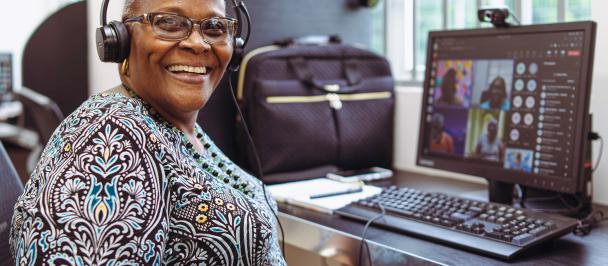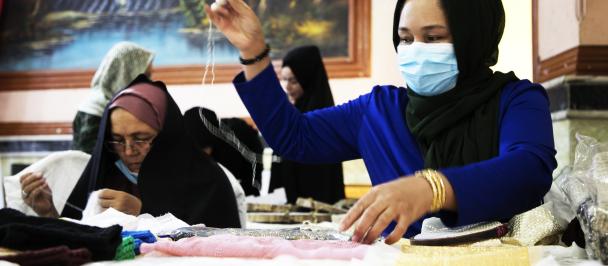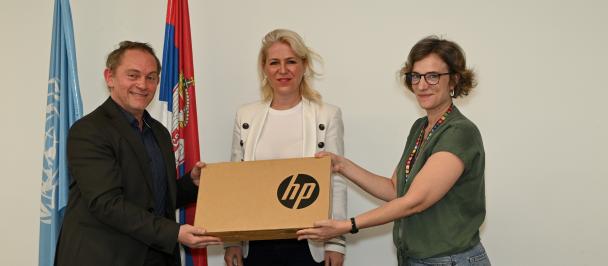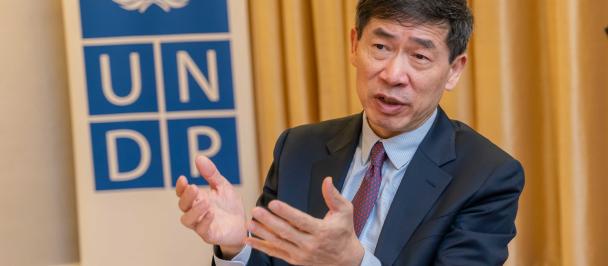Technology for Democracy and Human Rights: Lessons Learned and Way Forward
March 14, 2023

UNDP Geneva\ WSIS 2023. Left to right: Emily Schoemaker, UNDP senior expert in technology and democracy; Sarah Lister, Head of Governance, UNDP Bureau for Policy and Programme Support; Rober Opp, Chief Digital Officer UNDP; Teona Tomshvilli, co-founder of ForSet Georgia; Sheikh Hassina Chief a2i, egovernance strategist.
At the 2023 World Summit on Information Society Forum (WSIS), UNDP organised a side event on Technology for Democracy and Human Rights to stocktake important steps on for the future of digital cooperation. As one key take-away for effective digital governance and inclusive digital transformation, upholding a human rights-based approach to enable whole of society outcomes is critical across political actors, civil society, and the private sector.
The session was opened by Søren Vøhtz, Denmark’s Ambassador for Democracy and Human Rights, who shared insights from Denmark’s efforts under the Tech for Democracy initiative and underscored the value of multistakeholder cooperation in addressing challenges in the intersection between tech, democracy, and human rights. This event follows Denmark's led Tech for Democracy Initiative, launched in November 2021.
Read below three best-practices and approaches on technology for democracy and human rights.
I. Political actors and civil society must work together for effective digital governance and whole of society inclusion.
The digital governance divide has shown further stress and fragmentation if multilateral efforts to govern the digital world are delayed driving digital public good technologies.
According to Emily Schoemaker, UNDP senior expert in technology and democracy, "Strengthening political will to advance inclusion is a critical element of any transformation process – without the right intent and political will to listen to people's input, digital platforms can fuel apathy and distrust."
As part of this, UNDP supported the convening of an 'Action Coalition on Information Integrity in Elections', gathering expertise from organizations working across the entire electoral cycle to understand the impacts of disinformation within different election contexts and assess how the integration of technology in electoral settings can achieve inclusive, participatory, transparent, and peaceful elections. For example, vis-à-vis social media and information ecosystems using tools such as UNDP’s iVerify, analysis on debunking fake news and action points on information integrity in elections were formed.
II. Cooperation with the private sector to uphold human rights for inclusive digital transformation
The potential of digital transformation is fully realized when digital solutions are people-centered, protect human rights, and leave no one behind.
Microsoft Head of Partnerships, Jean-Yves Art explains how the private-sector is improving information integrity and human rights in the private-sector. Microsoft's Electionguard is an example of a digital technology to detect and verify election fraud and track votes, from casting to the final count, using an end-to-end open-source process.
Microsoft has also adopted the Paris Call - a charter for ensuring trust and security in cyberspace - committing to the nine principles adopted in 2017. Alongside more than 12,000 constituents who have endorsed the document to strengthen trust and security for cyberspace.
III. Digital transformation in the Global South needs support from non-state actors.
Multiple initiatives in the Global South show how non-state actors can contribute to digital transformation.
In Pakistan, UNDP Policy Analyst Umar Malik shared how the country office tested a real-time data tool to monitor social risk using empirical data to translate the needs of citizens into indicators for policy. These digital platforms produce positive twin solutions by increasing digital literacy for government and citizens and improving digital public policy decision making.
Chief a2i (Aspire to Innovate) e-governance strategist Sheikh Hassina explained how improving digital literacy has reduced poverty by half in Bangladesh. The national government's digital strategies, Smart Bangladesh Vision 2041, is a successful whole-of-government case study. Partnering with UNDP, a2i in Bangladesh has successfully set up several one-stop-shop information centres across Bangladesh and an e-government central service that provides over 1900 public services. A2I has also launched an SDG tracker and digital readiness assessment with over 70 indicators for informed policymaking.
In Peru, UNDP Policy Specialist Rodolfo Benites shared a leading project called Redpública, where youth voices feed into national and local solutions to address the most critical development challenges in the country. This was achieved by fostering civic participation in hybrid events, and crowdsourcing proposals through the Redpública digital platform to promote the findings with public, national, or regional stakeholders into advocacy.
Moreover, the role of civil society and digital cooperation is important to create a bridge between marginalized groups and increasing digital skill and literacy. By bringing together non-tech actors into the digital ecosystem, Teona Tomshvilli, co-founder of ForSet Georgia, train and identify young talent using code to develop open-source tools to hold the government accountable. Tomshivilli’s participants have gone as far as to put more pressure on transparent government data and creating open societies to strengthen democratic values in the digital ecosystem. As Tomshvilli stated, “Multilaterals can do their fair share to inject more youth-centered platforms” to co-design solutions addressing the pressing digital challenges faced today.


States, civil society, and the private sector must collaborate to reduce the digital governance divide, ensuring that technology supports democracy and human rights, and accelerates the digital transformation.
###
Acknowledging the stark implications of the digital divide on development, UNDP is committed to addressing barriers and resulting inequalities with a whole-of-society, inclusive, and rights-based approach.
Globally, to ensure meaningful connectivity for all, UNDP works with multi-stakeholder alliances including the Broadband Commission for Sustainable Development, Partner2Connect Digital Coalition, and the Edison Alliance to make policy and regulatory recommendations and advance collective action on closing the digital divide at national and global levels.
Click here to read UNDP’s digital strategy here.

 Locations
Locations




